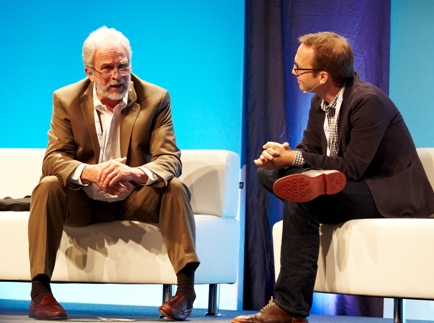
Rick Howe
The iTV Doctor is Rick Howe, who provides interactive television consulting services to programmers and advertisers. He is the recipient of a CTAM Tami Award for retention marketing and this year was nominated to Cable Pioneers. He is also the co-author of a patent for the use of multiscreen mosaics in EPG's. Endorsed by top cable and satellite distributors, "Dr" Howe still makes house calls, and the first visit is always free. His services include product development, distribution strategy and the development of low-cost interactive applications for rapid deployment across all platforms.
Fireside Chat with Google’s Thomas Riedl
EXECUTIVE Q&A by Rick Howe
Dear Readers: I had the pleasure of moderating a number of panels and sessions at TV Connect in London in late April. And one of the most intriguing opportunities was a “fireside” chat with Thomas Riedl, Head of Global Android TV Partnerships for Google. Here is my chat with Thomas.
Rick Howe: People assume this is a re-launch or re-invention of Google TV. But that’s not the case, is it?
Thomas Riedl: Google TV, which launched in 2010, was an Android-based TV platform and it served as an early vehicle for entering the market of connected TVs and for establishing strong partnerships. It also provided several lessons for our Product teams, for example that simplicity around a true leanback experience in front of a big screen is what really matters. Going forward, we’re focused on building out Android TV which is a new effort as part of the core Android platform.
Rick: In your slides, you mention RDK. Are you actually a member of the Comcast RDK family?
Thomas: No.
Rick: Do you intend to be?
Thomas: From our standpoint, Android TV is a great operating system for mobile devices, smart TVs, gaming platforms and set top boxes. If you want to pick up the free Android TV operating system for your set top box, it will help you expand your business.
Rick: You are teasing about the concept of being almost an aggregator of sorts. Are you going to offer consumers the ability to combine all their subscriptions with Netflix, SlingTV, HBO Now etc. with Android TV and handle all that for them? You talk about enabling commerce for third parties; are you going to do that for yourself?
Thomas: It’s all about offering a platform for the big screen that our partners can scale with and innovate on top of it, be it a leading broadcaster, PayTV operator or an up-and-coming game developer.
Rick: OK – lets’ look at casting. You said that when a programmer or operator was integrated with Chromecast, they are automatically integrated with Android TV. Is that right?
Thomas: Yes. If they are already integrated into Chromecast, they are already integrated into Android TV. In fact, they are already integrated into any device using Android TV.
Rick: When I first started using Chromecast, I was casting from my laptop using Chrome, and I was sending HBO Go over to the TV (you didn’t yet have HBO integrated into Chromecast). And I had terrible latency with that, mostly because I was using double the amount of WiFi bandwidth: once to get HBO Go to my laptop, and again to send it to the TV. Once HBO was integrated, the problem went away. Will you have that same problem with non-integrated content on Android TV?
Thomas: It’s so easy to get integrated with Android TV and Google Cast that there is no reason why all content providers and operators shouldn’t do it. It’s a great, simple user experience.
Rick: Can users on an Android TV enabled device easily share their TV experience, their favorites and their opinions on Facebook, Twitter and the other social platforms?
Thomas: This is exactly the kind of use case we encourage our Android developer community to think about and build out. Each application can easily integrate new services, the developer toolkit is the same as on Android phones and tablets today.
Rick: What did you learn at TV Connect?
Thomas: It’s a great conference, and I saw a lot of set top box companies, with innovative features, already using Android TV. That’s very exciting to us. All content playing on a single device really makes sense to the consumer.
It’s so easy to get integrated with Android TV and Google Cast that there is no reason why all content providers and operators shouldn’t do it. It’s a great, simple user experience.

